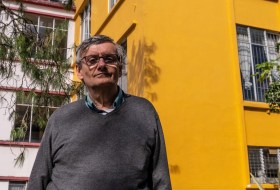News
150 years of the Faculty of Civil Engineering, history of a great legacy
University - Thursday, May 4, 2023
150 years of the Faculty of Civil Engineering, history of a great legacy
Based on the special account of Julio César Diago Franco, Civil Engineer and professor at the University of Cauca since 1979, we formally begin the commemoration of the 150th anniversary of the Faculty of Civil Engineering which, during all this time, has witnessed great life stories thus becoming the space for the construction of a legacy that represents in itself what we are as a University.
One morning in April 2023, we went to meet with the current Head of the Department of Structures of the Faculty of Civil Engineering, Julio César Diago Franco, with great emotion and great expectations of listening to him. When we arrive at his office, made up of several teaching workstations, we immediately notice how the engineer Diago's desk attracts attention, the reason? He is the only one who does not have a desktop computer. His desk, unlike the others, is occupied by a small tower of papers, next to several engineering books written in English... And there he was, reading one of these books that, noticing our presence, he left a side to welcome us. We had previously communicated with the purpose of jointly reconstructing the historical milestones of the Faculty of Civil Engineering, which in April 2023 celebrated its 150th anniversary, impressive!
In a meeting prior to the interview from which this story emerges, the engineer Diago had told us how the Civil Engineering program began to be built, at the University of Cauca, from the teaching of mathematics in the "Class of Philosophy" in the year 1828 and how, some time later, in the year 1854, its foundations were laid from the teaching of subjects such as Physics, Surveying, Topography and Architecture, until reaching the year 1873 where The Civil and Military Engineering course was established, which began activities with 11 students in April, according to the "Historical Monograph of the University of Cauca" written by Arcesio Aragón.
So, we asked him for permission to record the interview "Of course we are not going to tell any state secret," he answered laughing and continued, "In the time of the Soviet Union the People's Congress meets and one of the deputies says that the The Minister of Education is a brute, so they punish him and as is typical of the communist era, they call him things like a petty bourgeois and send him to jail for saying that the Minister of Education was a brute, they give him 20 years in jail, 5 for disrespect for authority and 15 for revealing a state secret” All those present laughed at the Engineer's comment, who ended by saying “It's a fine story”.
Engineer Diago is not from Popayán, he is from Santander, however, his father is from the capital of Cauca and was also a Civil Engineer. “He graduated in Civil Engineering in 1939. In 1936 he had finished his studies, but he had not completed his degree, and in 1939, by means of a Law of the National Government, the profession was regulated and those people who before They had not graduated on that date, they were given their university degree, that is in the memories of the University of Cauca, because it was an extraordinary event, I think that 90 engineers graduated, which was a gigantic number for the time, because the number of Graduates per year was 5 people, so in the previous 14 or 15 years, the number of engineers who had not obtained the title, achieved it through that government amnesty. This event is mentioned in the book as the "Gran Cochada", the "Gran Cochada" is, in engineering terms, the mixture of aggregates with asphalt, so it was called the Great Cochada and the graduation ceremony was held at the municipal theater, that was a sensational event in the city of Popayán”, says Engineer Diago with joy when remembering his father.
The father of the engineer, after receiving his degree from the University of Cauca, lived for a time in Cúcuta and due to economic changes at the border, he returned with his family to the city of Popayán, "My father came to Popayán and continued his work, linked up with the National Government and worked on a rehabilitation plan, which was carried out when President Guillermo León Valencia, from Popayanejo, achieved a peace with the liberal guerrillas and for this purpose a reconstruction plan for the country was established and my father was It corresponds to work in the northern area of Cauca, in Santander de Quilichao, and obviously start opening roads to the east.


